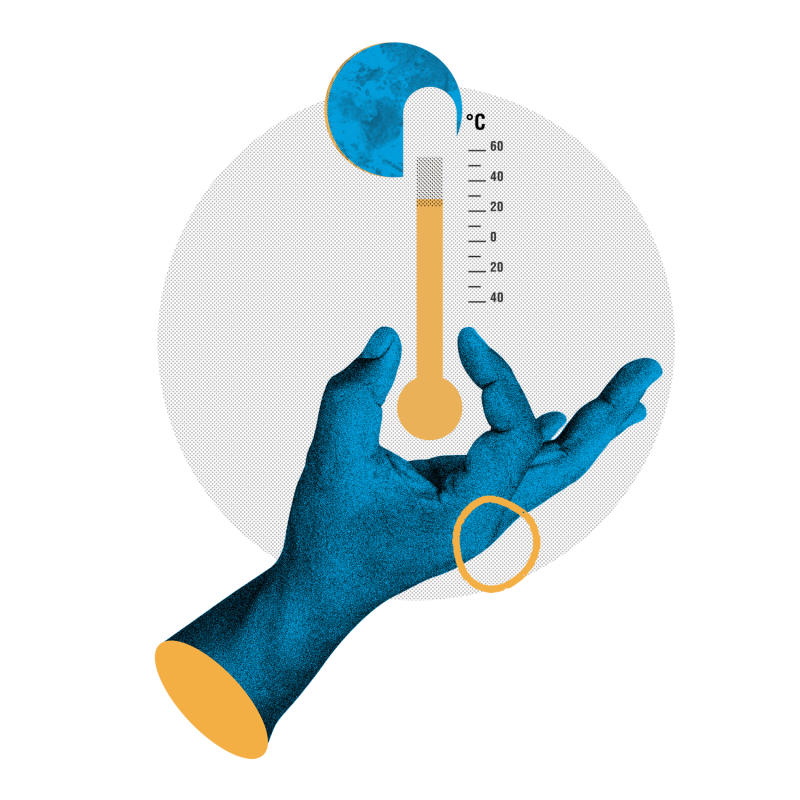We use a lot of energy in our homes and commercial buildings. In fact, studies show that the energy supply sector accounts for 35% of global emissions, the largest contributor to global greenhouse gas emissions! This is mainly because most countries still rely on fossil fuels for energy and buildings and homes consume a lot of energy in the form of heating and cooling, among others.. When we burn fossil fuels to produce electricity, carbon dioxide is released into the atmosphere which leads to climate change.
When it comes to reducing the global average individual carbon footprint from 6.3 tons (2020) to 2.1 tons in 2030 as recommended by experts, home energy is a significant area of opportunity. Keep reading for actions to reduce energy usage at home!
Reduce heating and cooling
Heating and cooling our homes requires the most energy and significantly contributes to global carbon emissions. We can reduce the energy burden by setting the thermostat to a lower temperature in the winter and setting it to a higher temperature in the summer. As an example, increasing the thermostat setting from 24°C to 28°C during the summer can reduce annual cooling energy use by more than a factor of three for a typical office building in Zurich, Switzerland. What’s also great is you’ll save money on your monthly energy bill as well!
What temperature is your thermostat currently set at? Can you change it to a temperature that requires less energy (ex. Warmer temperature in summer, colder temperature in winter)?
(Level of effort: medium)

Switch to renewable energy sources
Most of our energy comes from fossil fuels today. When we burn fossil fuels for energy, carbon dioxide is released, leading to accumulation of greenhouse gasses in the atmosphere and climate change. By switching to renewable energy, we can reduce our carbon footprint by up to 2.5 tons annually! If you live in a house or have access to a roof, installing solar panels could be a great way to not only reduce carbon emissions but also reduce energy bill costs in the long term. Many local energy providers also have ways to incorporate renewable energy for your household. Call or email your energy provider to find out how you can switch to more renewable sources.
Is your household a candidate for solar panels? Does your energy provider have renewable energy options?
(Level of effort: high)

Know your monthly energy consumption
Most people don’t know what their monthly energy consumption is and this is a great place to start because what gets measured gets changed! You can log into your energy provider to learn about your monthly usage and changes over time or take a look at your energy bill and start writing down or recording your energy usage in a place you can easily see!
What was your energy consumption last month? In the last 12 months, which month had the highest energy consumption? Which had the lowest?
(Level of effort: low)

Save energy wherever possible
Besides heating and cooling, appliances and lighting also consume a lot of energy. We can use less energy by lowering heating and cooling, switching to LED light bulbs and energy-efficient electric appliances, washing your laundry with cold water, or hanging things to dry instead of using a dryer. Improving your home’s energy efficiency, through better insulation for instance, or replacing your oil or gas furnace with an electric heat pump can reduce your carbon footprint by an average of 900 kilograms of CO2e per year – that’s almost 1 ton!
Where does your home have LED lights? Have you tried washing clothes with cold water and shortening wash cycles? Can you start hang drying laundry loads? What other appliances use a lot of energy?
(Level of effort: medium)
Source: Sustainable Development Goals

 1900 2039 – Ext: 408
1900 2039 – Ext: 408 thuvienntt@ntt.edu.vn
thuvienntt@ntt.edu.vn






